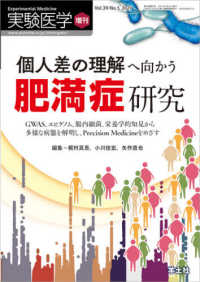- ホーム
- > 洋書
- > 英文書
- > History / World
Full Description
Matter and form have been fundamental principles in natural science since Greek Antiquity and their apparent rejection during the seventeenth century typically has been described as a precursor to the emergence of modern science. This volume reconsiders the fate of these principles and the complex history of their reception. By analyzing work being done in physics, chemistry, theology, physiology, psychology, and metaphysics, and by considering questions about change, identity, and causation, the contributors show precisely how matter and form entered into early modern science and philosophy. The result is our best picture to date of the diverse reception of matter and form among the innovators of the early modern period.
Contents
Preface
List of Contributors
List of illustrations
Three Biased Reminders about Hylomorphism in Early Modern Science and Philosophy, Gideon Manning
Body, Soul and Anatomy in Late Aristotelian Psychology, Michael Edwards
Living Atoms, Hylomorphism and Spontaneous Generation in Daniel Sennert, Hiro Hirai
Elective Affinity Before Geoffroy: Daniel Sennert's Atomistic Explanation of Vinous and Acetous Fermentation, William R. Newman
Substantial Forms as Causes: From Suarez to Descartes, Tad Schmaltz
Mechanizing the Sensitive Soul, Gary Hatfield
Descartes and His Critics on Matter and Form, Atomism and Individuation, Roger Ariew
Spirit is a Stomach: The Iatrochemical Roots of Leibniz's Theory of Corporeal Substance, Justin Smith
Leibnizian Hylomorphism, Daniel Garber
Index







